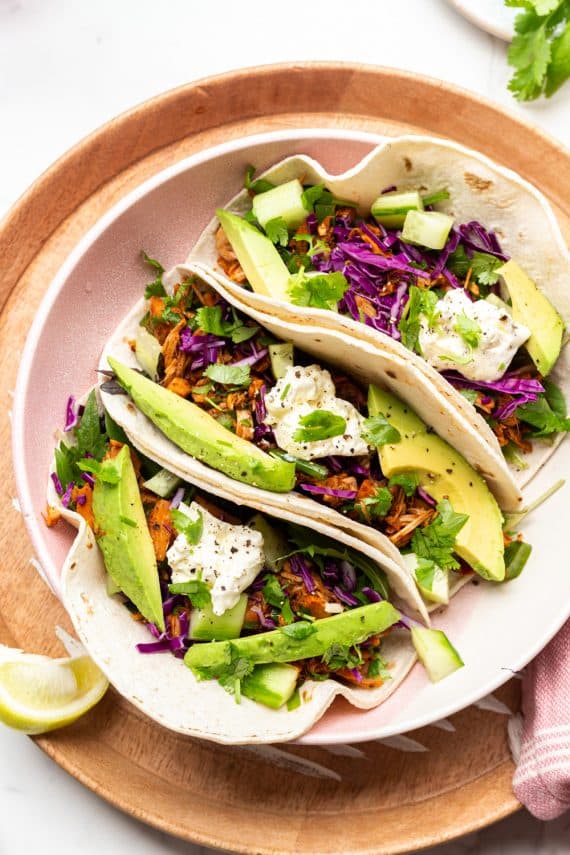What is Xylitol? And is it high FODMAP?
Xylitol is a high FODMAP sugar alcohol (polyol), that can wreak havoc on our digestive systems and trigger IBS symptoms. To make sure xylitol doesn’t sneak into your low FODMAP diet, you need to understand where to find it and why it is a problem.
Where is Xylitol found?
Low levels of xylitol naturally occur in fruits, vegetables, and other plants (1 2). For example, foods such as raspberries, strawberries, and endives contain xylitol (3). However, the levels appear to be low enough that these fruits and vegetable all have low FODMAP servings (6). Xylitol becomes an issue when it is commercially extracted and used in higher amounts as an artificial sweetener. Commercial xylitol is extracted from corncobs and hardwood trees (2). It is then added to processed foods such as chewing gum, protein powders, and sugar free products like candies/lollies, chocolate, and diet drinks (1). Some medications also contain xylitol, so if you are concerned talk to your doctor or pharmacist.
What is Xylitol labelled as?
Xylitol can be a sneaky FODMAP especially if it is listed as a food additive E967 or 967 in the ingredients list. When checking labels watch out for Xylitol, birch sugar, or E967 or 967 (4 5). In the USA xylitol should be listed as its full name in the ingredient list.
Why is Xylitol a problem?
Xylitol is a sugar alcohol (polyol) and sugar alcohols are hard for our bodies to process. Only one-third of the polyols consumed are actually absorbed by our bodies, and the level of absorption depends on the type of polyol and the individual (7). When xylitol is poorly absorbed, our gut bacteria rapidly ferment it, which leads to Irritable Bowel Syndrome symptoms (7 6).
Are you ready to take control of your gut symptoms?
No thanks, my gut is perfect.
Article continues below
In large amounts xylitol is also a natural laxative, as it draws water into the large intestine when it is poorly absorbed, which stimulates bowel movements (7). This is why sugar free products containing xylitol often have a written warning saying that the product could have a laxative effect.
Final Thoughts
Remember to steer clear of diet products and processed foods if they include xylitol or E967, to avoid tummy troubles. For more useful articles on the low FODMAP diet follow us on Facebook or subscribe to our newsletter.
Image credit: Krzycho/Shutterstock.com












I put a Xylitol tablet in my upper gum during the night to avoid a dry mouth, will it affect my FODMAP diet. Is it a HIGH FODMAP or is it safe for me to use.
Hi Mary-Jean,
Xylitol is considered high FODMAP. Depending on how much xylitol is in the tablet it could affect your symptoms if you are sensitive to polyols. It might be worth talking to your doctor or dentist about an alternative option to use for a couple of weeks, then you could test your tolerance to the tablets.
I tried xylitol in a hot drink twice. I didnt know what hit me. I was in agony for about 10 hours. Triggered of my ibs, hiatal hernia and brought out my abdominal heria. So painful. Please be careful if you have similar conditions.
Hi Rosalin,
We are sorry to hear that xylitol made you sound sick. It is a polyol that is known to cause gut issues so that is most likely why it trigger your symptoms. We hope you are feeling much better now and have managed to avoid this ingredient in other products.
I am looking for a good low fodmap toothpaste. Unfortunately, I get canker sores when I use a toothpaste with sodium Laurel sulfate AND the substances in my toothpaste that my IBS doesn’t like, can cause canker sores too! Could you address the toothpaste problem?
Hi Cathleen,
Thanks for reaching out to us. Have you talked to a dietitian about the reactions you are having to toothpaste? Sometimes the reaction you are describing can indicate a food chemical sensitive instead. A dietitian is the best person to help you figure this out and to recommend a toothpaste that will suit your needs.
I have been advised to chew xylitol gum due to dry mouth. Does the xylitol in gum cause the same issues as the xylitol in food?
Hi Danielle,
Thanks for reaching out to us. Xylitol is a polyol and it can cause the same issues in gum as it does in food. This is because the FODMAPs can dissolve out of the product and into your saliva and then progress through your digestive tract. Everyone has a different tolerance to polyols and you might find you tolerate xylitol okay. This means we would suggest you try the gum and just see how you go. If you have a negative change in symptoms then talk to your healthcare team about alternative options.
Just noticed xylitol in my LIFEPAK VITAMIN POWDER there’s Stevia at the end of ingredients ( a favorite plant) but Fructose and xylitol’s 1st and 2nd hmmmm these are FANTASTIC vit min and carotinoids etc should I avoid?
Hi Judi,
How are your symptoms at the moment? If your symptoms are settled, then you could leave the vitamins in your diet – the low FODMAP diet only needs to be as strict as needed to reduce symptoms. If you are still struggling with symptoms, then you could consider removing this supplement for 1 – 2 weeks to see if removing it helps reduce your symptoms. We hope that helps.
Thank you for this article. Prior to investigating Xylitol, I started using a small amount of Xylitol in my morning tea. Big mistake. I have suffered daily with an upset tummy, diarrhea and inflammation. Xylitol was the only change in my diet, so I took the time to explore the issue. I will watch for Xylitol in products from now on. Thank you.
Hi Julie,
Well done on figuring out your trigger food and we hope your symptoms continue to remain settled. It’s lovely to hear you found the article useful.